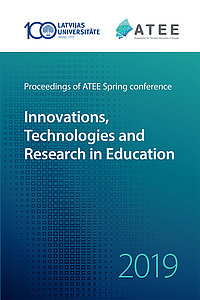
Proceedings of ATEE Spring Conference
“Innovations, Technologies and Research in Education, 2019”
Editor Linda Daniela, University of Latvia, Latvia
ISBN 978-9934-18-482-6
https://doi.org/10.22364/atee.2019.itre
The book “Innovations, technologies and research in education, 2019” includes research papers presented at the ATEE Spring Conference 2019 (http://ateespringconference.lu.lv) on emerging trends in technology-enhanced learning, on innovative educational ideas, and on how to facilitate learning motivation, transformative learning, integrative learning, constructivism and constructionism, novel approaches, and innovative educational solutions. The ATEE Spring Conference has been organized by the Association of Teacher Education in Europe and the University of Latvia biannually since 1997.
Contents
Preface
Neus Lorenzo Galés, Ray Gallon. Integrating Education, Technology, and SDG’s: a three-pronged collaboration
Lana Frančeska Dreimane. Understanding the Educational Rationale Behind Learning in Virtual Reality: a Historical Development Vignette
Francesco Maiorana. Interdisciplinary Computing for Ste(a)m: a Low Floor High Ceiling Curriculum
Bashar Zogheib. Using Structural Equation Modelling to Study the Influence of Perceived Usefulness and Perceived Compatibility on Students’ Attitudes Towards Using Ipad
Daiga Kalnina, Armands Kalnins. Interactions Between Parenting Style in the Family and the Use of Smartphones and Tablets of 2–3 Years Old Children
Irēna Žogla, Svetlana Ušča, Mihails Kijaško. Focus on Curriculum Transformation Through Educator and Student Attitude Development to Digital Competence
Santa Dreimane. Technology-Enhanced Learning for the Development of Learning Motivation
Anna Vulāne, Elita Stikute. The Importance of Digital Resources in the Instruction of Modern Latvian Language and Literature
Annika Käck. The Use of Digital Technologies in Swedish Teacher Education: Experiences by Migrant Teachers
Ragmi Mustafa, Kujtim Mustafa, Xhevdet Thaqi, Basri Ahmedi, Ekrem Halimi. Digitalization as a Process of Assistance in the Transparency of University Teaching
Maria Giulia Ballatore, Igor Simone Stievano, Anita Tabacco. Teach-Gym: Grow Your Methodologies
Elin Birkeland Markestad, Bjørg Herberg Gloppen. Technology and Relationships in the Guidance Context: an Article Based on a Study of Sustainable Relationships in Guidance Situations Between Teachers and Students in Higher Education
Andis Āriņš. Blockchain Arhitecture in Smart Pedagogy
Jevgenija Dehtjare, Jekaterina Korjuhina, Ilona Gehtmane-Hofmane. An Application of the Modern Technological Solutions in an Order to Enhance the Process of Distance Learning
Edmunds Vanags, Pavels Pestovs. Development of Metacognition Awareness Scale for 10th–12th Grade
Anda Priedite. Enhancing Students’ Metacognition in the Classroom
Manuel Joaquín Fernández González. Character Growth Mindset Enhancement in Extracurricular Activities: an International Study
William Nketsia, Maxwell Peprah Opoku, Eric Lawer Torgbenu. Teacher Trainees’ Experiences of Inclusive Practices During Teaching Practice
Otilia Clipa, Valentina Juravle. The Roles of the Online Environment in School–Family Communication
Gunta Siliņa-Jasjukeviča, Ilze Briška. Reflection of Preservice Teacher Professional Performance for Promoting Transdisciplinary Learning in Primary School Education
Daiga Celmiņa. Artistic Cognition in Secondary School Literature Lessons
Antra Ozola, Andrejs Geske. What Do Teachers Do to Promote Students’ Reading Literacy at 4th Grade? – Evidence From Iea Pirls 2016 Study
Liene Ozoliņa. The Students’ Visual Literacy for Knowledge Construction in the History of Latvia and the World
Nijolė Bražienė, Daiva Grakauskaitė-Karkockienė. Writing (Text Creation) Development of Primary Students at their Mother Tongue Lessons: Teachers’ Attitude
Sandrita Škėrienė. The Integration of Problem Solving and Value Approach: the Shift Toward How to Think
Pavels Pestovs, Dace Namsone. National Level Large-Scale Assessment Data for Instructional Planning in Classroom
Lūcija Anoško. Fine Motor Skills Development in Preschool-Age Children with Speech and Language Disorders
Zanda Rubene, Artis Svece. Development of Critical Thinking in Education of Latvia: Situation Analysis and Optimisation Strategy
Kristine Jozauska. The Concept of Power in Teacher Talk in Contextuality of Teacher’s Authority
Araromi Maxwell Olakunle. Attitude and Vocabulary Knowledge as Predictors of Senior Secondary School Students’ Achievement in French Reading Comprehension in Selected Secondary Schools in Ibadan Metropolis
Zanda Rubene, Gunita Elksne. The Contribution of Transnational Learning to the Professional Development of Teachers
Ilze Šūmane, Baiba Martinsone, Dita Nīmante, Malgožata Raščevska, Solvita Umbraško. Support Team for Children With Special Needs in Latvian Schools
Ilona Gehtmane-Hofmane. Grounded Theory Methodology for Understanding How Equine Assisted Learning Contributes to Adult Learning
Irēna Andersone, Guntars Bernāts. Collective Music Making as a Developer of a Teenage Personality as a Whole
Ilze Saleniece, Dace Namsone, Līga Čakāne, Anete Butkēviča. Towards a Context-Specific School Leadership Competence Framework: a Case Study of Latvia
Normunds Rečs, Andrejs Geske. The Professional Learning Community as an Organizational System for School Staff Development, School Change and Improvement
Asta Rauduvaitė, Greta Šadeikytė. The Aspects of Improving Teacher’s Professional Activity Oriented Towards the Learner’s Wellbeing and Success
Līva Goba-Medne. Shifting the Focus of Professional Development: from Individual Teachers’ Competences to a System of Contextual Professional Activity
Anete Butkēviča, Līga Čakāne, Inese Dudareva, Dace Namsone. Piloting a Teacher Competence Management Model in Schools
Oskars Kaulens. Informal Learning for Teachers’ Professional Development at School: Opportunities and Challenges
Liat Biberman-Shalev. Rereading Freshman-Year Blogs: Third-Year Pre-Service Student Teachers Review Their First-Year Reflective Blogs
Dita Nīmante, Maija Kokare. Teacher’s Motivation for Master Degree Program in Educational Sciences in Latvia
Dace Medne, Nora Jansone Ratinika. Professional Mastery of Academics in Higher Education: the Case of Latvia
Beatrix Fűzi, Erzsébet Jármai. The Features and Types of University Students’ From the Viewpoint of Teachers
Juris Porozovs. Latvia Students’ Interest in Different Science Subject Topics
Anna Stavicka, Indra Odiņa, Anna Sedova. The Impact of Native Language and Culture on Foreign Language Learning: the Case of Chinese Students Learning the Latvian Language
Jelena Stepanova. Team-Based Learning in Business English in Latvia and EU
Olga Zvereva. Approaches to Embedding Global Dimension in Adult Education Curriculum by the Case Study of the Hospitality Business Toolkit
Austra Avotina. The Cultural Competence Portfolio as a Long-Term Innovation for All Levels of Education
Rudīte Koka, Nora Jansone-Ratinika, Tatjana Koķe, Matīss Sīlis, Raimonds Strods. Mapping as a Tool for Biomaterials Study Content Harmonization With Significant Research Findings
Reinis Upenieks. Exploring Possibilities of Transformative Learning in Continuing Medical Education: a Literature Review

 CONFERENCE
CONFERENCE